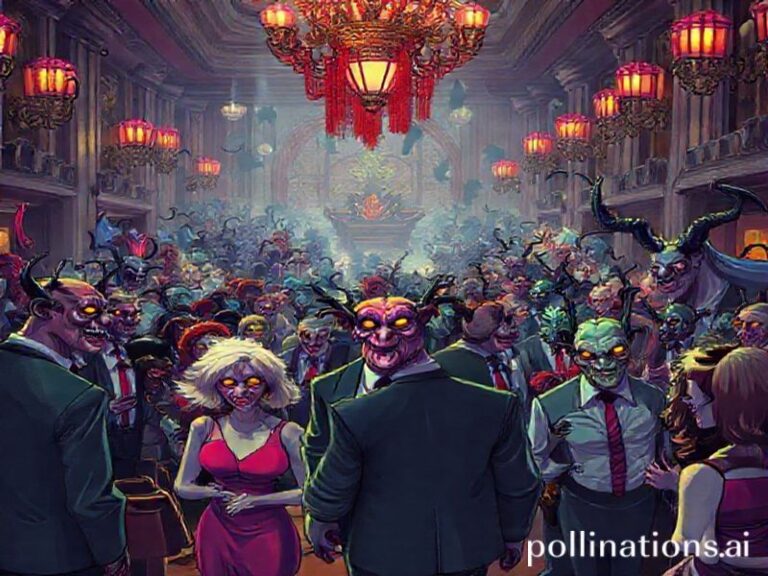Jalynn Polk: The 19-Year-Old Wide Receiver Accidentally Steering Global Discourse
The Curious Case of Jalynn Polk, or How a 19-Year-Old Wide Receiver Accidentally Became a Geopolitical Rorschach Test
By the time most teenagers have figured out which end of a tax form is up, Jalynn Polk has already been drafted by the New England Patriots, weaponized by Chinese sports-apparel bots, meme-ified by Nigerian football-fan accounts, and held up in a Munich beer hall as proof that American decline is “definitely still on schedule, ja?” Not bad for a kid whose greatest crime, so far, is running a 4.41-second 40-yard dash without first issuing a press release on global equity.
The international feeding frenzy began the moment Polk’s name scrolled across the ticker during the 2024 NFL Draft. In Senegal, café owners swapped kora playlists for grainy YouTube highlights, wondering aloud whether the lanky Texan could out-jump their local basketball prodigies. Over in Seoul, esports streamers ran side-by-side comparisons between Polk’s route tree and their favorite League of Legends gank paths, because apparently nothing says “future Hall of Famer” like looking vaguely similar to a pixelated assassin. And in a windowless London flat, a Brexit-tired commodities trader tried—and failed—to short-sell American optimism by betting against Polk’s jersey sales. (He is currently reconsidering both his portfolio and his life choices.)
Why does a second-round draft pick trigger such planetary commotion? Simple: we’re starved for uncomplicated narratives. While the Arctic belches methane and central banks play Jenga with interest rates, Polk offers the rare story line that doesn’t require a PhD in misery studies. He catches oblong leather objects, evades other large humans, and—crucially—hasn’t yet been caught laundering cryptocurrency for a petro-dictator. In a world where every toddler’s tantrum is live-streamed for IPO valuation, that qualifies as moral clarity.
Of course, clarity never lasts. Within 48 hours of the draft, state media in two competing superpowers had recast Polk as either a testament to free-market meritocracy or a cautionary tale about capitalist excess, depending on which flag was flapping behind the anchor desk. Somewhere in the middle, French intellectuals published a 4,000-word essay arguing that Polk’s post-route body language “deconstructs Cartesian dualism,” which is academic shorthand for “we’re all going to die, but at least the kid can high-point a fade.”
The economic ripple effects are equally absurd. A factory in Ho Chi Minh City that normally churns out knockoff Yeezys has reportedly retooled to produce counterfeit Polk jerseys for fans who want to cosplay American gridiron glory without paying NFL licensing fees. Meanwhile, a cryptocurrency startup in Dubai—motto: “Because the planet wasn’t burning fast enough”—has launched $POLKCoin, a token whose white paper is just a GIF of a touchdown dance looped over a Hans Zimmer soundtrack. Early investors swear it’s “the next Dogecoin, but with more hamstring risk.”
And then there’s the soft-power calculus. The U.S. State Department, ever eager to weaponize pop culture, has reportedly floated the idea of sending Polk on a “friendship tour” through nations where America’s brand is about as popular as a root canal. Picture it: a 6-foot-2 wide receiver jogging routes through the streets of Algiers, flanked by nervous diplomats clutching laminated playbooks and existential dread. One misrun slant and suddenly it’s not just footballs being intercepted—it’s decades of foreign policy.
All of which raises the question: what happens when the inevitable occurs? Not an ACL tear—though Vegas already has odds—but the first dropped pass, the first fumble, the first cryptic tweet at 3 a.m. The same internet that crowned him will, with the enthusiasm of a Roman coliseum, volunteer to drive the chariot. International commentators will pivot from “symbol of youthful promise” to “metaphor for imperial overreach” faster than you can say “content calendar.”
Still, for one fleeting spring, Jalynn Polk has done what the UN, Davos, and three seasons of “Ted Lasso” could not: given disparate humans a shared hallucination that maybe—just maybe—the next generation won’t screw things up quite as spectacularly as forecast. It’s a fragile delusion, sure, but so is fiat currency, and look how long that’s lasted.







